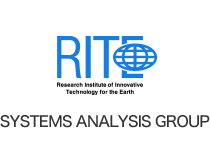Project for international cooperation on the analysis and assessment of technologies for climate change mitigation (ALPS II; FY2012-FY2016)
ALPS Project(ALternative Pathways toward Sustainable development and climate stabilization)
Conclusion
The Paris Agreement managed to set up a framework where all countries should participate in emission reductions. It is evaluated as a first step to implement true green growth. However, we can see that there are large differences of emissions reduction efforts among INDCs of different countries. Moreover, the Paris Agreement not only aims at a 2ºC target, but seeks efforts to a 1.5ºC target, and at a zero emission target at the end of the 21th century. The election of climate sceptics President Trump in the US will be an opportunity to reconsider the stability of international framework to respond to climate change. As an ambitious target does not necessarily guarantee a continuous fight over climate change on the long-term, the compatibility of climate change mitigation and economic growth is indispensable for a truly effective climate change mitigation. Clear guidance and concrete measures, rather than wishful thinking, are needed to deliver steady progress toward green growth. Moreover, while there are numerous uncertainties, there is a great need for a strategy that will handle risks in a comprehensive manner. Although we need further insights and deeper analysis, we believe this study offers a relevant framework to pursue "true green growth" and concrete measures, also providing quantitative analysis and evaluation for that.

